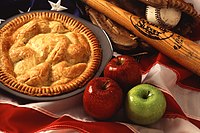
Back Kuchyně Nové Anglie Czech Cuisine de la Nouvelle-Angleterre French מטבח ניו אינגלנד HE Նոր Անգլիայի խոհանոց Armenian Olahan New England JV ახალი ინგლისის სამზარეულო Georgian Ars coquinaria Novae Angliae Latin New Englands kök Swedish
| Part of a series on |
| American cuisine |
|---|
 |

New England cuisine is an American cuisine which originated in the New England region of the United States, and traces its roots to traditional English cuisine and Native American cuisine of the Abenaki, Narragansett, Niantic, Wabanaki, Wampanoag, and other native peoples. It also includes influences from Irish, French-Canadian, Italian, and Portuguese cuisine, among others. It is characterized by extensive use of potatoes, beans, dairy products and seafood, resulting from its historical reliance on its seaports and fishing industry. Corn, the major crop historically grown by Native American tribes in New England, continues to be grown in all New England states, primarily as sweet corn although flint corn is grown as well.[1] It is traditionally used in hasty puddings, cornbreads and corn chowders.
Many of New England's earliest Puritan settlers were from eastern England, where baking foods (for instance, pies, beans, and turkey) was more common than frying, as was the tradition elsewhere.[2]
Three prominent characteristic foodstuffs native to New England are maple syrup, cranberries and blueberries. The traditional standard starch is potato, though rice has a somewhat increased popularity in modern cooking. Traditional New England cuisine is known for a lack of strong spices, which is because of local 19th century health reformers, most prominently Sylvester Graham, who advocated eating bland food.[3] Ground black pepper, parsley, garlic, and sage are common, with a few Caribbean additions such as nutmeg, plus several Italian spices.
The use of cream is common, due to the reliance on dairy. The favored cooking techniques are stewing, steaming, and baking. Many local ingredients, such as squash, corn and local beans, sunflowers, wild turkey, maple syrup, cranberries and dishes such as cornbread, Johnnycakes and Indian pudding were adopted from Native American cuisine.
- ^ USDA (2008). "New England Agricultural Statistics - Sweet corn".
- ^ David Hackett Fischer, Albion's Seed: Four British Folkways in America (Oxford University Press US, 1991) 30-50 [1]
- ^ Ayrouth, Elie. "Here's the weird reason graham crackers were invented". Business Insider. Archived from the original on May 15, 2022. Retrieved May 15, 2022.